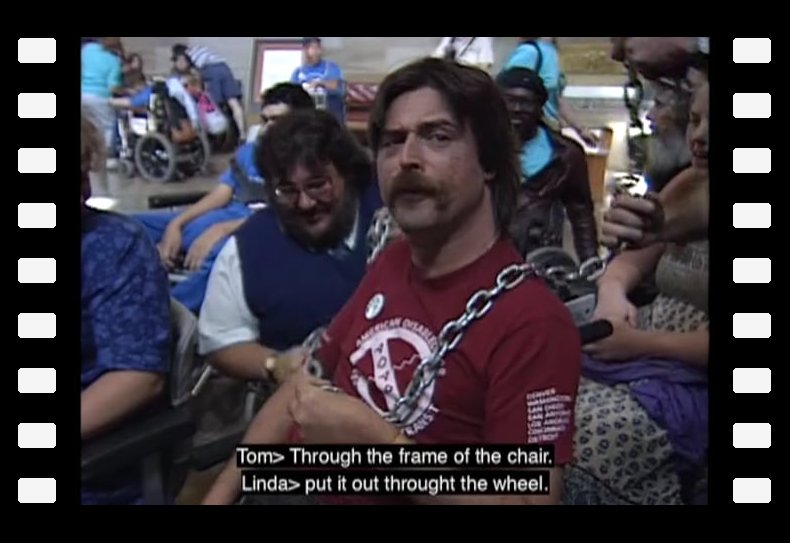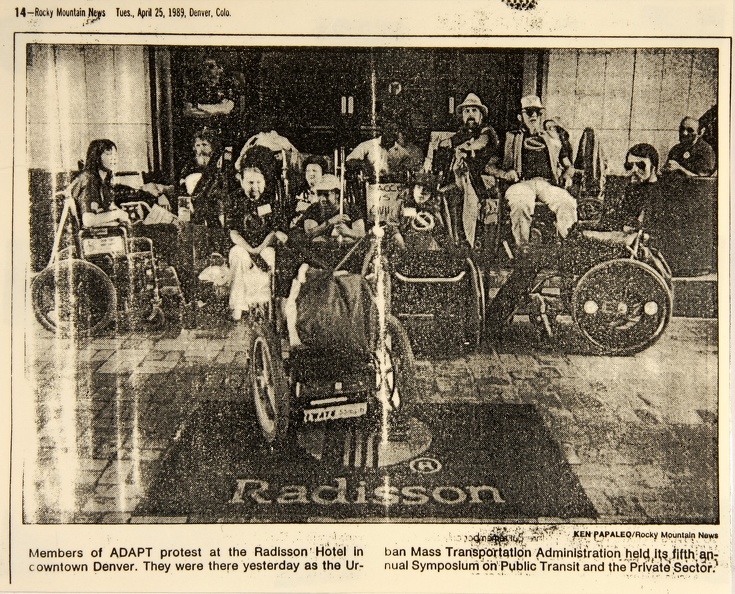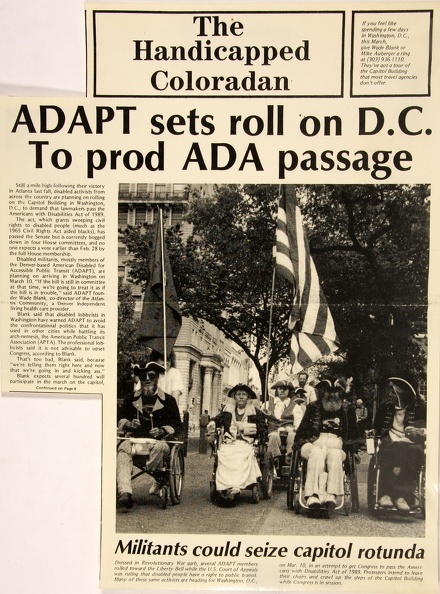- LanguageAfrikaans Argentina AzÉrbaycanca
á¥áá áá£áá Äesky Ãslenska
áá¶áá¶ááááá à¤à¥à¤à¤à¤£à¥ বাà¦à¦²à¦¾
தமிழ௠à²à²¨à³à²¨à²¡ ภาษาà¹à¸à¸¢
ä¸æ (ç¹é«) ä¸æ (é¦æ¸¯) Bahasa Indonesia
Brasil Brezhoneg CatalÃ
ç®ä½ä¸æ Dansk Deutsch
Dhivehi English English
English Español Esperanto
Estonian Finnish Français
Français Gaeilge Galego
Hrvatski Italiano Îλληνικά
íêµì´ LatvieÅ¡u Lëtzebuergesch
Lietuviu Magyar Malay
Nederlands Norwegian nynorsk Norwegian
Polski Português RomânÄ
Slovenšcina Slovensky Srpski
Svenska Türkçe Tiếng Viá»t
Ù¾Ø§Ø±Ø³Û æ¥æ¬èª ÐÑлгаÑÑки
ÐакедонÑки Ðонгол Ð ÑÑÑкий
СÑпÑки УкÑаÑнÑÑка ×¢×ר×ת
اÙعربÙØ© اÙعربÙØ©
Leathaineach abhaile / Albums / Tags protest + Bob Kafka
+ Bob Kafka + Joe Carle
+ Joe Carle 4
4

 US_Capitol_Rotunda_part_2_cap
US_Capitol_Rotunda_part_2_cap
This is part 2 of the ADAPT Capitol Rotunda protest in support of the Americans with Disabilities Act, ADA. This shows the group preparing for civil disobedience to pressure swift passage of the bill. Over 100 people were arrested at this protest, which gets less attention than the Crawl but was equally intense. The film is open captioned (as are all videos on this museum site). ADAPT (481)
ADAPT (481)
14—Rocky Mountain News., April 25, 1989, Denver, Colo PHOTO by KEN PAPALEO/Rocky Mountain Naws A group of ADAPT people in wheelchairs and sitting on the ground form a blockade in front of a major entryway to the Radisson Hotel. The hotel doormat is visible in front of the group. Behind them a single cop, with his arms folded across his chest, stands to one side of the door. From left to right the group includes: a woman in a manual chair, Bob Kafka sitting on the ground, Barb Guthrie facing out and behind her someone in a wheelchair facing in, next to that person is a person on the ground and in front of that person is Anita Cameron in a cap and holding her white cane, in front of her is an empty wheelchair facing the group. Next to Anita is Stephanie Thomas on the ground with her chair facing her, and behind her is Bernard Baker. Next to Bernard is Mike McTimmus and beside him is Joe Carle in his manual chair. In front of Joe, George Florum sits sidways and looks out at the camera with a pissed off expression intensified by his dark sun glasses. Behind and to the side of him is Chris Hronis in a power chair, and someone stands behind him. Caption reads: Members of ADAPT protest at the Radisson Hotel in downtown Denver. They were there yesterday as the Urban Mass Transportation Administration held its fifth annual Symposium on Public Transit and the Private Sector.![ADAPT (583) (5084 visits) Fort Worth Star Telegram / Sunday March 26, 1989
[Headline] Disabled evicted by guards
[Subheadi... ADAPT (583)](_data/i/upload/2015/07/22/20150722133110-2c90a67f-me.jpg) ADAPT (583)
ADAPT (583)
Fort Worth Star Telegram / Sunday March 26, 1989 [Headline] Disabled evicted by guards [Subheading] Fort Worth protest at courthouse ends BY Whitt Canning, Fort Worth Star Telegram Bob, Joe, Frank, Tim and Frazier spent a quiet evening Friday on the ninth floor of the Federal Building nodding off occasionally between friendly chats with the guards. Having arrived earlier in the day to take part in a protest by a group of disabled people against the Urban Mass Transit Administration, they hadn't really planned on staying the night. Things just sort of worked out that way. Their strange vigil ended abruptly about 1:15 p.m. yesterday when they were evicted by Federal Protection Service officers, who explained that it was being done for their own good. “They physically picked us up and carried us out," said Bob Kafka, admiring a skinned place on his right forearm that was bleeding slighty. “At least," said Joe Carle, “it was reassuring being in the hands of the kinder, gentler Bush administration." Kafka, 43, Carle, 50, Frank Lozano, 38, and Tim Baker, 26, are members of a group called American Disabled for Accessible Public Transportation that staged a nationwide protest Friday in an effort to dissuade the administration from appealing a recent decision in the 3rd Circuit Court of Appeals (ADAPT vs. Burnley). The decision requires wheelchair lifts on buses purchased with federal money. The Fort Worth protest involved 20 to 30 people, but Kafka, Carle, Lozano and Baker managed to reach the ninth-floor office of the administration's regional manager, Wilbur Hare. There, they requested he telephone White House chief of staff John Sununu and voice his support for the court decision. Joining the small group in its audience with Hare was Frazier, an amiable pooch who serves the visually impaired Lozano as a guide dog. Hare refused the request, and went home at 4:45 p.m., leaving the intrepid little band stuck on the ninth floor, vowing to stay through Easter weekend. “We were in the outer office, and he (Hare) came out once about 3:30 and told us he was leaving at his normal time," Carle said. "Then at 4:45, he came out, shook our hands, wished us happy Easter, and left. "We wished him happy Easter too." So the group was left occupying the building, along with several guards. At 6 p.m., Casey Bowen, director of building operations with the General Services Administration, told them they would not be forcibly removed, but he would not allow food to be brought in. As an added precaution, Kafka said, all the phones were removed. “I don't mean just in Hare‘s office," Kafka said. "lt looked to me like they removed every phone on the ninth floor. They didn‘t just disconnect them. They TOOK the phones off.“ The group settled in for the night. "Mostly, we tried to sleep as best we could, sitting in our chairs (Kafka, Carle and Baker use wheelchairs)" Kafka said. "I got the couch, since l'm the oldest," Carle said. “Frank slept on the floor because he doesn't have a wheelchair.“ "There are some vending machines up there," Kafka said, "and we ate some candy bars and drank some cokes that was about it. "The guards were very nice to us -- until today, when they evicted us." [Subheading] PROTEST About 6:30 a.m. yesterday, Kafka said, they asked the guards if they could send out for food and were refused. About 11 a.m. the group's attorney, Paul Alexander, arrived with the same request and also was refused. Then about l p.m., the group made another request — that Hare appear at a 6 p.m. news conference and agree to make the call to Washington tomorrow. ln return, they would end their occupation of the building. "That's when they evicted us," Kafka said. “They said they were acting on Bowen's orders and it was for our own good because we hadn't had anything to eat. “They picked me up out of my chair, because l wasn't going to leave, and carried me. That's how I got skinned up." “They had a little trouble getting Frank into a wheelchair," Carle said. “But Frazier went quietly when ordered to leave." Baker, who is severely disabled, did not fare so well, group members said. “When they were pushing him out in his chair, they didn't know how to operate it, and they tore up the motor and the clutch,“ Kafka said. “They did about $1,000 worth of damage to it." Guards at the building refused to comment. Hare did not show up at the news conference. And the I3 activists held up the starting time of 6 p.m. to wait for additional supporters who did not arrive. “We came here to fight for transportation, but we couldn't get the troops over to fight for them," Carle said, adding that none of the disabled could ride the bus downtown so only those who could afford a car could come. Kafka said that the group will examine legal recourse for injuries and damages incurred while being evicted. However, the group's lawyer, Paul Alexander, had advised the four that they might not have legal grounds because they were on federal property, Carle said. As to whether the demonstrators felt they had accomplished anything by the protest, Carle said, “We hope that somewhere along the line this wakes up the able-bodied community" and shows members of the disabled community that “they don't have to knuckle under." He said the group's impromptu occupation of Hare's office had probably amazed them as much as anyone else. “When we got here (with the other protesters), I was telling Bob that Mr. Hare was a pretty nice guy and would probably make the phone call fairly quickly," Carle said. “We were trying to figure out what we were going to do with the rest of the afternoon.“ Carle said other protests are planned soon, including one against Greyhound Corp. on Monday in Dallas. Greyhound, he said, has indicated it does not wish to adapt its buses to the handicapped. “I think this was an abomination," Kafka said. “As a Vietnam veteran, l am embarrassed for my country. But it's just another example of how the govrnment views the disabled. They don't want us to be people — they want us to sit down and shut up, or be put away in institutions. “I think a lot of people have a fear of the disabled." “They're trying to put us back where we've been for ... eternity," Carle said. "Instead of doing this, they should help us with job training so we can carry our own weight. “It's the only way we will ever become . . . people." The occupying force at least had a clear view of its immediate objective once it was back out on the street: friends who arrived to help were immediately dispatched to find food (“double burgers, chicken, and big milkshakes"). When the food gathering force hurried off, Carle offered one last observation on the situation. "Frazier," he confided. “is extremely upset about all this. “He says they treated him like a dog." Staff writer Betsy C.M. Tong contributed to this report PHOTO (by Ricky Moon, Fort Worth Star-Telegram): From left to right Frank Lozano kneels on the pavement, his hand on his dog Frazier's neck. Frazier, a white lab, sits calmly in harness, looking serenely off into the distance. Beside him is Joe Carle in a denim vest, ADAPT shirt, gimmie cap and dark glasses, he sits in his wheelchair and smiles. Next to him, Tim Baker, face partially obscured by his chin operated wheelchair control stick, looks over at Bob Kafka. Kafka, next to him is in his manual wheelchair and is talking to Tim. Behind them is the stark facade of the federal building. Caption reads: Frank Lozano, his dog Frazier, Joe Carle, Tim Baker and Bob Kafka, from left, sit outside the Federal Courthouse after their eviction. ADAPT (537)
ADAPT (537)
The Handicapped Coloradan Small Text Box: If you feel like spending a few days In Washington, D.C. this March, give Wade Blank or Mike Auberger a ring at (303) 936-1110. They've got a tour of the Capitol Building that most travel agencies don't offer. PHOTO (by Tom Olin): Joe Carle, Diane Coleman, Bob Kafka and Mark Johnson, all in wheelchairs and dressed in revolutionary garb lead a march under the leafy trees of Philadelphia's historic district. They have tri-cornered hats, jackets with fancy buttons, ruffled shirts, a fife and drum. Behind the front of the line Ann ___ is visible, as well as other marchers. Diane carries the ADAPT flag and Joe has another dark flag on a tall pole. Caption: Militants could seize capitol rotunda -- Dressed In Revolutionary War garb, several ADAPT members rolled toward the Liberty Bell while the U.S. Court of Appeals was ruling that disabled people have a right to public transit. Many of these same activists are heading for Washington, D.C. on Mar. 10, in an attempt to get Congress to pass the Americans with Disabilities Act of 1989. Protesters intend to leave their wheelchairs and crawl up the steps of the Capitol Building while Congress is in session. Article begins: ADAPT sets roll on D.C. To prod ADA passage Still a mile high following their victory in Atlanta last fall, disabled activists from across the country are planning on rolling on the Capitol Building in Washington, D.C., to demand that lawmakers pass the Americans with Disabilities Act of 1989. The act, which grants sweeping civil rights to disabled people (much as the 1965 Civil Rights Act aided blacks), has passed the Senate but is currently bogged down in four House committees, and no one expects a vote earlier than Feb. 28 by the full House membership. Disabled militants, mostly members of the Denver-based American Disabled for Accessible Public Transit (ADAPT), are planning on arriving in Washington on March 10. "If the bill is still in committee at that time, we're going to treat it as if the bill is in trouble," said ADAPT founder Wade Blank, co-director of the Atlantis Community, a Denver independent living health care provider. Blank said that disabled lobbyists in Washington have warned ADAPT to avoid the confrontational politics that it has used in other cities while battling its arch-nemesis, the American Public Transit Association (APTA). The professional lobbyists said it is not advisable to upset Congress, according to Blank. That's too bad, Blank said, because "we're telling them right here and now that we're going in and kicking ass.” Blank expects several hundred will participate in the march on the capitol, with about 125 of the protesters prepared to leave their chairs and crawl upon the capitol steps while other militants sneak in and seize the rotunda itself. If all that works out, it could be ADAPT’s biggest action so far in its seven-year struggle to force transit companies to put a lift on every bus in the country. The federal government unofficially agreed to support that goal in a deal hammered out between representatives of ADAPT and President Bush in Atlanta last October. Part of that deal called upon the President to push for disabled rights in his State of the Union address, which he did, much to the satisfaction of ADAPT, which Blank described as being “very pleased” with Bush. “Now we're going to smoke out a few Democrats," he said. When the agreement was reached in Atlanta, two cities had already started the process of purchasing non-lift equipped buses. Since then Pittsburgh has reversed its position and agreed to buy only accessible buses, while Albuquerque refused to consider altering its plans. “They’ll go down in history as the last city in America to buy lift-less buses," Blank said. In the months since Atlanta, ADAPT has switched its attention to pushing for lifts on intercity coaches. To that end some 45 wheelchair demonstrators were in Dallas Jan. 21-24 to picket a joint meeting of the American Bus Association (ABA) and the United Bus Owners of America (UBOA). Greyhound, the largest intercity bus company, is headquartered in Dallas. Most of those demonstrators were participating in their first action, which Blank said proves that ADAPT is continuing to grow in strength and power. On the first day, pickets blocked the entrance to the conference hotel with relatively little fireworks. But on Monday, Jan. 22, the protesters hit the Greyhound depot where some 29 demonstrators were arrested for blocking buses. Twenty of those were first-time arrestees. Trial has been set for Feb. 12. On the third day, protesters stormed in the exposition hall and interrupted a trade show demonstrating the latest advances in bus design. Most of that design had nothing to do with helping wheelchair riders get on board, Blank said. UBOA president Wayne Smith, who has published articles in the New York Times arguing against the transit provisions of the ADA, decided not to call in the police, and for three hours militant wheelchair protesters engaged in debate with professional transit providers. “It was a very successful happening,” Blank said. He said he hoped that spirit would hold true for the Washington, D.C., action, where he expects to see more first-time protesters. A seminar on ADAPT’S history and tactics is set for Mar. 10 at the Comfort Inn on H Street in northwestern Washington, where neophyte activists are urged to go even if they are planning to stay elsewhere during the action. Although the ADA covers all disabilities, this action, called the “Wheels of Justice," will center on the rights of the mobility-impaired. Blank said he tried to coordinate his action with other groups, including the National Federation of the Blind (NFB), but was rebuffed. “They don't think of themselves as disabled,” he said. “And that’s fine.” (For more on this topic see Homer Page’s column on page 2, “The ADA and the Blind.”) Some blind advocacy groups, including the NFB, have argued that they don't want adaptive devices, such as special buttons on street corners, written into the bill. “We don't need them," said Page, who is vice president of the Colorado NFB chapter. Those people wishing to participate in ADAPT‘s “Wheels of Justice" should contact Blank or Mike Auberger at (303) 936-1110. PHOTO: Medium close up of Wade Blank from the waist up. He is smiling, wearing dark sun glasses and a vest. His below shoulder length blondish hair is parted in the middle. This text covers the article that appears in 537 and 538.